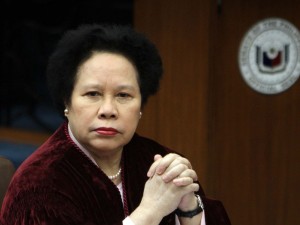Santiago proposes Magna Carta for Internet
Senator Miriam Defensor-Santiago has filed a bill crafting a Magna Carta for Philippine Internet Freedom (MCPIF) that would replace the recently enacted but still controversial Republic Act No. 10175, or the Cybercrime Prevention Act of 2012.
Santiago’s Senate Bill No. 3327, that would repeal RA 10175, appears to be a more comprehensive measure providing not just prohibited acts and stiff penalties but also guarantees the rights and protection of Internet users in the country.
While it provides for the freedom of speech and expression on the Internet, it also penalizes Internet libel and hate speech.
While it protects the Internet as an open network, it provides stiff jail penalties and fines for such cybercrimes as hacking, cracking and phishing.
Santiago said her bill would protect the rights and freedoms of Filipinos in cyberspace, while defining and penalizing cybercrimes.
“While it is important to crack down on criminal activities on the Internet, protecting constitutional rights like free expression, privacy and due process should hold a higher place in crafting laws,” she said.
Freedom in cyberspace
Santiago said that unlike RA 10175, the MCPIF upholds the freedom of expression of Filipinos in cyberspace.
“The MCPIF does not suffer from overbreadth and vagueness in its provisions on libel, unlike the law it tries to replace. In fact, it treats libel as a civil liability rather than a criminal act, which is a step forward in the move to decriminalize libel,” Santiago said.
Cyberlaw ‘unconstitutional’
The Santiago bill proposes to repeal RA 10175, whose implementation has been suspended after the Supreme Court, acting on at least 15 petitions questioning the new law’s constitutionality, issued a 120-day temporary restraining order in October. It has set oral arguments on the case for next January.
Angry protests attended the entire process of approving the cybercrime bill, which President Aquino signed into law and which took effect on Oct. 3. Those critical of the new law include journalists’ groups, bloggers, netizens and some politicians who object in particular to the inclusion of libel as a cybercrime.
Santiago has argued that RA 10175 is unconstitutional because of its “overbreadth and vagueness” that makes certain Internet activities punishable.
She said that her bill differs from RA 10175 in that it guarantees citizens’ rights against illegal searches and seizures.
“RA 10175 violates the right to privacy and the constitutional guarantee against illegal search and seizure through allowing the warrantless real-time collection of traffic data,” Santiago said.
“In contrast, the MCPIF ensures due process by providing strict guidelines for any collection of any data, including the securing of warrants, obligating notification and limiting seizure to data and excluding physical property,” she added.
The senator said the MCPIF also mandates government agencies to provide security for the data they collect from citizens to ensure their right to privacy.
“The dangerous ‘takedown’ clause of
RA 10175, where the government may have a website or network blocked or restricted without due process of law, is absent in the MCPIF,” Santiago said.
“My bill specifically provides for court proceedings in cases where websites or networks are to be taken down and prohibits censorship of content without a court order,” she added.
The proposed MCPIF also prohibits double jeopardy, Santiago said.
The cybercrime law, on the other hand, allows double jeopardy through the prosecution of offenses committed against its provisions and prosecution of offenses committed against the Revised Penal Code and special laws, even though the offenses are from a single act, she said.
Santiago said the proposed Magna Carta also would clarify the mandate and organization of the proposed Department of Information and Communications Technology (DICT), the creation of which is currently pending in Congress.
Handling cybercrimes
“Because of the broad range of responsibilities related to the enforcement of laws governing ICT, a department-level office should be established and its functions and jurisdiction should be clear-cut,” she said.
The senator said the MCPIF prepares the proposed DICT, law enforcement agencies and the military with provisions for handling cybercrimes.
Santiago said Section 47 of the bill provides amendments to the AFP (Armed Forces of the Philippines) Modernization Act to ensure the country has weapons and defenses against cyberattacks by terrorists, violent nonstate actors and rogue or enemy nation-states.
She added that the bill’s Section 48 mandates the Philippine National Police and the National Bureau of Investigation to combat cyberterrorism.
“We need to recognize that child pornography, child abuse and human trafficking can be committed through the Internet, as much as hacking, piracy and copyright infringement. We must define these evils in order for us to crush them,” Santiago said.
She said the proposed Magna Carta also provides for harnessing ICT for national development by ensuring that government agencies keep up with the realities of and advances in information technology, such as those involving consumer welfare and copyright laws.
Drafted by netizens
The senator, a former law professor, said her Magna Carta bill could become the first law to be crafted through crowdsourcing, which she describes as a process of getting the job done by tapping people on the Internet.
According to Santiago, it was concerned netizens that include software designers, information technology experts, academics, bloggers, engineers, lawyers and human rights advocates who went to her with a draft of the MCPIF.
She said the group formulated the MCPIF through discussions in an open Facebook group, e-mail, Google Hangout teleconferences and social media channels like Twitter.
Santiago said the country needs a more effective cyberlaws because information and communications technology and the Internet are the drivers of economic growth.
She cited a 2012 report of the Department of Science and Technology that said the business process outsourcing industry, the information technology outsourcing industry and other outsourcing industries have contributed $11 billion in revenue, or an estimated 5.4 percent, to the gross domestic product of the country in 2011.















